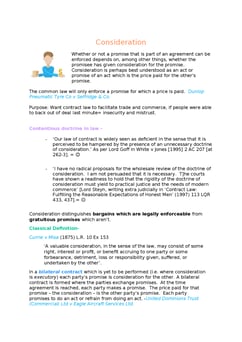Walton Stores v Maher [1988] 164 CLR 387
Judgement for the case Walton Stores v Maher
Table Of Contents
Plaintiff entered negotiations with Defendant about Defendant knocking down a building and building a new one to Plaintiff’s specifications that Plaintiff would lease.
When 40% of the work was completed Plaintiffs decided to break off the agreement.
High Court of Australia ruled that although there was no contract (no definite offer and acceptance since it was a case of “I’ll let you know if there are any problems” which is NOT an acceptance - see Re Selectmove doctrine).
However, Plaintiff was estopped from denying being bound and would have to pay damages.
Majority approach
In Central London Property v High Trees House Denning J in obiter extended promissory estoppel outside of contractual relationships. It extends to the enforcement of voluntary promises on the basis that a departure from the assumption underlying the transaction must be “unconscionable.”
The circumstances of this case (where Defendant knew that Plaintiff laboured under the impression that the promise would be enforced) made it unconscionable to allow Defendant to rescind on the promise.
Brennan J
In ordinary agreements where both parties recognise they have the freedom to withdraw then it cannot be unconscionable for them to do so. It is only if one party induces the other to believe that they are bound that it is unconscionable for them to then withdraw.
A non-contractual promise only creates equitable estoppel where the promisor induces the promisee to induce or expect that their relations have become binding that the promise becomes enforceable.
Unlike contractual obligations, equitable estoppel requires NO consideration.
It is illogical that equity should be regarded as a “shield, not a sword” since there is no moral reason why a promise not to enforce legal rights should be capable of estoppel, but not a promise to give new legal rights. This is an artificial distinction (though it does preserve the purpose of consideration, and to get rid of it would create problems of exploitative agreements being valid).
-
To establish equitable estoppel there are 6 conditions:
Plaintiff believed a legal relationship existed between Plaintiff and Defendant;
Defendant induced Plaintiff to adopt the assumption;
The Plaintiffs act/omit to act based on that assumption;
Defendant knew or intended Plaintiff to do so;
Plaintiff’s act/omission will be a detriment to him if promise not fulfilled;
Defendant failed to avoid the detriment occurring to Plaintiff.
RELATED CASES
For Further Study on Walton Stores v Maher

A collection of the best GDL notes the director of Oxbridge Notes (an O...
Need instant answers? Our AI exam tutor is here to help.
Ask questions 🙋 Get answers 📔 It's simple 👁️👄👁️
Our AI is educated by the highest scoring students across all subjects and schools. Join hundreds of your peers today.
Get StartedSimilar Cases
Related Product Samples
These product samples contain the same concepts we cover in this case.
| GDL Contract Law | Promissory Estoppel Notes (5 pages) |
| Contract Law | Promissory Estoppel Notes (6 pages) |


 Since 2010, Oxbridge Notes has been a trusted education marketplace, supplying high-quality materials from top achievers at universities like Oxford, Cambridge, LSE, Harvard, and Yale.
Since 2010, Oxbridge Notes has been a trusted education marketplace, supplying high-quality materials from top achievers at universities like Oxford, Cambridge, LSE, Harvard, and Yale.